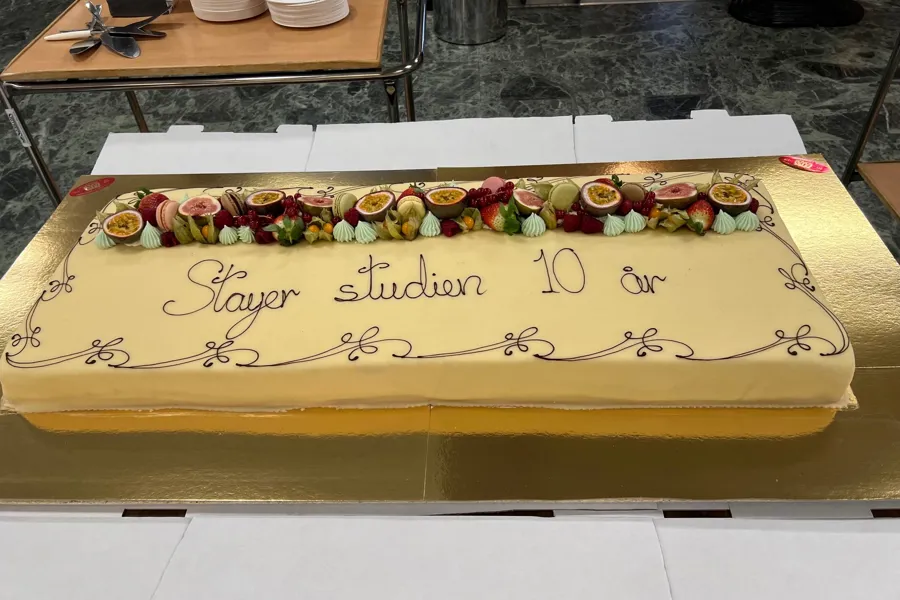The Stayer Study

Primary research aims
- Describe clinical recovery from substance use disorder
- Describe personal recovery from substance use disorder.
- Expand our knowledge of cognitive determinants in substance use disorder, with emphasis on different types of cognitive assessment.
Project details
Participants: N= 208 patients were recruited from the Stavanger University Hospital catchment area between March 2012 and January 2016.
Timeframe: The project will complete its data collection in 2026.
Principal investigator: Prof. Aleksander Hagen Erga, PhD
Project group: Thomas Svendsen, Anne Lill Mjølhus Njå, Siri Lunde, user representatives in various roles.
Research group: The project group also includes a multidisciplinary research group with background in clinical psychology, social work, and sociology.
Current PhD-candidates: Elise Constance Fodstad, Thomas Svendsen and Sandra Drevsjø.
PhD alumni: Mariann Vigdal, Jens Hetland, Inger Eide Robertson, Fredrik D. Moe, Egon Hagen.
Collaboration: Researchers from University of Stavanger, University of Bergen, Manchester Metropolitan University, University of Pennsylvania, Aarhus University, and several clinical research groups in Norway.
Scientific publications
- Vigdal, M.I., et al., Stories of building friendships during long-term recovery from problematic substance use. Qualitative Social Work, 2024. 23(5): p. 868-886.DOI: 10.1177/14733250241242028.
- Moe, F.D., et al., The interdependence of substance use, satisfaction with life, and psychological distress: a dynamic structural equation model analysis. Front Psychiatry, 2024. 15: p. 1288551.DOI: 10.3389/fpsyt.2024.1288551.
- Hetland, J., A.J. Lundervold, and A.H. Erga, Cognitive impairment as a predictor of long-term psychological distress in patients with polysubstance use disorders: a prospective longitudinal cohort study. BMC Psychiatry, 2024. 24(1): p. 143.DOI: 10.1186/s12888-024-05600-x.
- Fodstad, E.C., et al., Personality traits as predictors of recovery among patients with substance use disorder. J Subst Use Addict Treat, 2024. 162: p. 209360.DOI: 10.1016/j.josat.2024.209360.
- Erga, A.H., et al., The Relationship Between Self-Reported Childhood Maltreatment and Mental Health in Substance Use Disorders: A 6-Year Retrospective Analysis. J Dual Diagn, 2024. 20(3): p. 210-222.DOI: 10.1080/15504263.2024.2338799.
- Vigdal, M.I., et al., Rebuilding Social Networks in Long-term Social Recovery from Substance-Use Problems. British Journal of Social Work, 2023. 53(8): p. 3608-3626.DOI: 10.1093/bjsw/bcad134.
- Hetland, J., et al., Performance on Cognitive Screening Tests and Long-Term Substance Use Outcomes in Patients with Polysubstance Use Disorder. Eur Addict Res, 2023. 29(2): p. 150-159.DOI: 10.1159/000528921.
- Veseth, M., et al., "And then the rest happened"- A qualitative exploration of the role that meaningful activities play in recovery processes for people with a diagnosis of substance use disorder. Subst Abus, 2022. 43(1): p. 260-266.DOI: 10.1080/08897077.2021.1941506.
- Fodstad, E.C., et al., Personality and substance use disorder: Characteristics as measured by NEO-personality inventory-revised. Front Psychol, 2022. 13: p. 982763.DOI: 10.3389/fpsyg.2022.982763.
- Erga, A.H., et al., Persistent sleep problems among people in recovery from substance use disorders: a mixed methods study. Addiction Research & Theory, 2022. 30(6): p. 422-430.DOI: 10.1080/16066359.2022.2074406.
- Belfrage, A., et al., Traumatic Experiences and PTSD-symptoms in Polysubstance Use Disorder: A comparison of recovered versus current users. Nordic studies in Alcohol and Drugs, 2022.DOI: https://doi.org/10.1177/1455072522112222.
- Svendsen, T.S., et al., Securing Participant Engagement in Longitudinal Substance Use Disorder Recovery Research: A Qualitative Exploration of Key Retention Factors. Journal of Psychosocial Rehabilitation and Mental Health, 2021. 8(3): p. 247-259.DOI: 10.1007/s40737-021-00222-y.
- Robertson, I.E., et al., The hunt for a job: narrating the process of gaining employment for people in recovery from lives dominated by drug use. Drugs-Education Prevention and Policy, 2022. 29(6): p. 675-684.DOI: 10.1080/09687637.2021.1973962.
- Robertson, I.E., et al., Narratives of Change: Identity and Recognition Dynamics in the Process of Moving Away From a Life Dominated by Drug Use. Contemporary Drug Problems, 2021. 48(3): p. 204-222.DOI: 10.1177/00914509211027075.
- Hetland, J., et al., Prevalence and Characteristics of Borderline Intellectual Functioning in a Cohort of Patients With Polysubstance Use Disorder. Front Psychiatry, 2021. 12: p. 651028.DOI: 10.3389/fpsyt.2021.651028.
- Svendsen, T.S., et al., "Becoming myself": how participants in a longitudinal substance use disorder recovery study experienced receiving continuous feedback on their results. Subst Abuse Treat Prev Policy, 2020. 15(1): p. 8.DOI: 10.1186/s13011-020-0254-x.
- Erga, A.H., et al., Trajectories of psychological distress during recovery from polysubstance use disorder. Addiction Research & Theory, 2021. 29(1): p. 64-71.DOI: 10.1080/16066359.2020.1730822.
- Bjornestad, J., et al., Reports of the benefits of drug use from individuals with substance use disorders. Psychother Res, 2020. 30(6): p. 718-727.DOI: 10.1080/10503307.2019.1677965.
- Veseth, M., et al., A Stabilizing and Destabilizing Social World: Close Relationships and Recovery Processes in SUD. Journal of Psychosocial Rehabilitation and Mental Health, 2019. 6(1): p. 93-106.DOI: 10.1007/s40737-019-00137-9.
- Robertson, I.E. and S.M. Nesvag, Into the unknown: Treatment as a social arena for drug users' transition into a non-using life. Nordisk Alkohol Nark, 2019. 36(3): p. 248-266.DOI: 10.1177/1455072518796898.
- Hagen, E., et al., Measuring cognitive impairment in young adults with polysubstance use disorder with MoCA or BRIEF-A - The significance of psychiatric symptoms. J Subst Abuse Treat, 2019. 97: p. 21-27.DOI: 10.1016/j.jsat.2018.11.010.
- Bjornestad, J., et al., "A Life More Ordinary" Processes of 5-Year Recovery From Substance Abuse. Experiences of 30 Recovered Service Users. Front Psychiatry, 2019. 10: p. 689.DOI: 10.3389/fpsyt.2019.00689.
- Andreassen, O., et al., The Effect of High-Intensity Interval/Circuit Training on Cognitive Functioning and Quality of Life During Recovery From Substance Abuse Disorder. A Study Protocol. Front Psychol, 2019. 10: p. 2564.DOI: 10.3389/fpsyg.2019.02564.
- Svendsen, T.S., et al., How to Maintain High Retention Rates in Long-Term Research on Addiction: A Case Report. Journal of Social Work Practice in the Addictions, 2017. 17(4): p. 374-387.DOI: 10.1080/1533256x.2017.1361831.
- Hagen, E., et al., One-year abstinence improves ADHD symptoms among patients with polysubstance use disorder. Addict Behav Rep, 2017. 6: p. 96-101.DOI: 10.1016/j.abrep.2017.08.005.
- Hagen, E., et al., One-year sobriety improves satisfaction with life, executive functions and psychological distress among patients with polysubstance use disorder. J Subst Abuse Treat, 2017. 76: p. 81-87.DOI: 10.1016/j.jsat.2017.01.016.
- Hagen, E., et al., Assessment of Executive Function in Patients With Substance Use Disorder: A Comparison of Inventory- and Performance-Based Assessment. J Subst Abuse Treat, 2016. 66: p. 1-8.DOI: 10.1016/j.jsat.2016.02.010.
For project site in Norwegian, click here: Stayer-studien (helse-stavanger.no)
